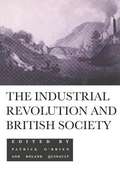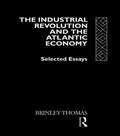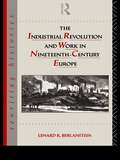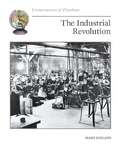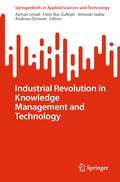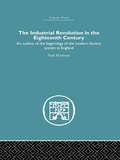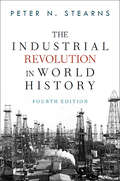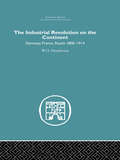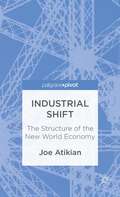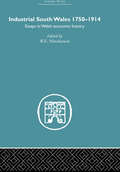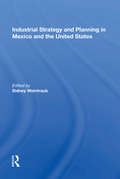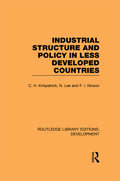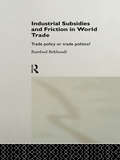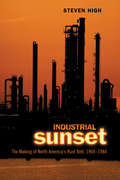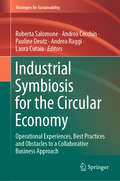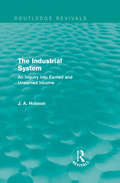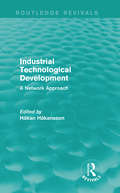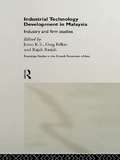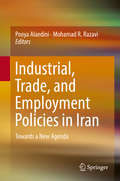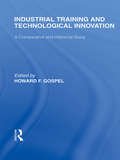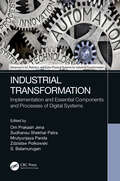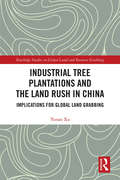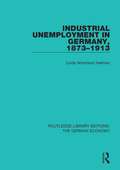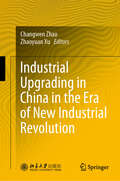- Table View
- List View
The Industrial Revolution and British Society
by Patrick K. O'Brien Roland QuinaultThe distinguished international contributors focus on topics currently at the centre of scholarly interest, and draw together the latest research in an accessble and stimulating manner. The intention throughout is to introduce a broad student readership to important aspects and consequences of the first Industrial Revolution. The contributors are acknowledged specialists in their respective fields of economic, social and political history, and employ a variety of different disciplinary skills. Particular attention is paid to the concept and historiography of the Industrial Revolution. Each chapter draws attention to the other literature on the subject, pointing the way to further reading. The Industrial Revolution and British society offers the most up-to-date overview of recent scholarship on this subject. It will be widely used as a textbook on advanced courses on British economic and social history.
The Industrial Revolution and the Atlantic Economy: Selected Essays
by Thomas BrinleyIn recent years it has become commonplace to downplay notions of an industrial revolution and argue instead that Britain's transformation was gradual and incremental. In The Industrial Revolution and the Atlantic Economy Brinley Thomas contests this view, arguing that change in the energy base and hence in technology has enabled Britain to overcome
The Industrial Revolution and Work in Nineteenth Century Europe (Rewriting Histories)
by Lenard R. BerlansteinThe Industrial Revolution is a central concept in conventional understandings of the modern world, and as such is a core topic on many history courses. It is therefore difficult for students to see it as anything other than an objective description of a crucial turning-point, yet a generation of social and labour history has revealed the inadequacies of the Industrial Revolution as a way of conceptualizing economic change. This book provides students with access to recent upheavals in scholarly debate by bringing a selection of previously published articles, by leading scholars and teachers, together in one volume, accompanied by explanatory notes. The editor's introduction also provides a synthesis and overview of the topic. As the revision of historical thought is a continual process, this volume seeks to bring the reinterpretation of such debates as working-class formation up to the present by introducing post-structuralist and feminist perspectives.
The Industrial Revolution (Cornerstones of Freedom)
by Mary CollinsA history of the Industrial Revolution focusing primarily on the United States during the nineteenth century and on the change from an agrarian society to one based on machines and factories.
The Industrial Revolution for Kids: The People and Technology That Changed the World, with 21 Activities (For Kids series #51)
by Cheryl MullenbachThis blend of authoritative historic overview and human interest stories recounts one of the most important eras in American history This educational activity book introduces young readers to the Industrial Revolution through the people, places, and inventions of the time, from the incredibly wealthy Rockefellers and Carnegies and the dingy and dangerous factories of the day to the creation of new forms of transportation and communication. By recounting this fascinating period in American history through the eyes of everyday workers, kids, sports figures, and social activists whose names never appeared in history books--including Hannah Montague, who revolutionized the clothing industry with her highly popular detachable collars and cuffs and Clementine Lamadrid, who either helped save starving New Yorkers or scammed the public into contributing to her one-cent coffee stands--this book helps tell the human stories of the Industrial Revolution. Twenty-one engaging and fun crosscurricular activities bring the times and technologies to life and allow for readers to make an assembly line sandwich, analyze the interchangeable parts of a common household fixture, weave a placemat, tell a story through photographs, and much more. Additional resources featured include books to read, places to visit, and websites to explore.
Industrial Revolution in Knowledge Management and Technology (SpringerBriefs in Applied Sciences and Technology)
by Azman Ismail Fatin Nur Zulkipli Jimisiah Jaafar Andreas ÖchsnerThis book addresses various aspects of knowledge management and technological advances that are driving the ongoing industrial revolution. This revolution is being driven by the rapid development of several key technologies, particularly in the areas of artificial intelligence, robotics, Big Data, the Internet of Things, nanotechnology, and biotechnology. Another most important and useful concept is knowledge management because modern organizations rely on knowledge and its development to achieve long-term benefits. Therefore, different research directions can have a significant impact on the industrial revolution and its results.
The Industrial Revolution in the Eighteenth Century: An outline of the beginnings of the modern factory system in England
by Paul MantouxThis classic volume, first published in 1928, is a comprehensive introduction to all aspects of the Industrial Revolution. Arranged in three distinct parts, it covers: * Preparatory Changes* Inventions and Factories* The Immediate Consequences. A valuable reference, it is, as Professor T. S. Ashton says in his preface to this work, 'in both its architecture and detail this volume is by far the best introduction to the subject in any language... one of a few works on economic history that can justly be spoken of as classics'.
The Industrial Revolution in World History
by Peter N. StearnsThe industrial revolution was the single most important development in human history over the past three centuries, and it continues to shape the contemporary world. With new methods and organizations for producing goods, industrialization altered where people live, how they play, and even how they define political issues. By exploring the ways the industrial revolution reshaped world history, this book offers a unique look into the international factors that started the industrial revolution and its global spread and impact. In the fourth edition, noted historian Peter N. Stearns continues his global analysis of the industrial revolution with new discussions of industrialization outside of the West, including the study of India, the Middle East, and China. In addition, an expanded conclusion contains an examination of the changing contexts of industrialization. The Industrial Revolution in World History is essential for students of world history and economics, as well as for those seeking to know more about the global implications of what is arguably the defining socioeconomic event of modern times.
Industrial Revolution on the Continent: Germany, France, Russia 1800-1914
by W.O. HendersonThis book was first published in 1961.
Industrial Shift: The Structure of the New World Economy
by Joe AtikianThis unique macro level analysis of the world's industrial structure reveals that ongoing advances in agriculture and manufacturing underpin the majority of growing economies.
Industrial South Wales 1750-1914: Essays in Welsh Economic History
by W. E. MinchintonSouth Wales was one of the main centres of the Industrial Revolution in Britain but the story of the rapid growth of an industrial society there has not yet been fully told, since much of the work done has consisted of articles rather than books. This volume brings together a selection of important contributions hitherto only accessible in a large number of scattered periodicals. These articles have been selected to present a considered sequence and are preceded by an introduction which puts the story of the industrialization of Wales into perspective. They deal firstly with the problems of population and migration then with the basic industries of iron, coal, tinplate and copper. These are followed by essays on banking, and the volume concludes with contributions on trade unionism and building. This is by no means merely the story of regional development since the book has a wider appeal; a number of the articles are concerned with the links with America and with the place of Wales in the Atlantic economy. Amongst the authors are the late Sir Lewis Namier and some of the leading writers on the history of modern Wales including Brinley Thomas and A. H. Dodd.
Industrial Strategy And Planning In Mexico And The United States
by Sidney WeintraubThe role of industrial planning in trade is one of the most important areas of dispute between Mexico and the United States. The official U.S. stance stresses the dominance of the marketplace, while official Mexican industrial policy demands a large and active government role. Although the United States espouses free trade in theory, in practice it
Industrial Structure and Policy in Less Developed Countries (Routledge Library Editions: Development)
by Colin Kirkpatrick N. Lee Fred NixsonFirst published in 1984, this textbook analyses, at both aggregate and micro economic levels, the contemporary industrial conditions in Third World countries and relates this to the process of economic growth and structural transformation. Drawing upon both industrial and development economics, the authors offer a comprehensive and integrated treatment of the different levels of industrial analysis in less developed countries, alongside a wealth of comparative data on industrial structure, business concentration and behaviour, and industrial policies in a cross-section of countries in Africa, Asia, the Far East and Latin America.
Industrial Subsidies and Friction in World Trade: Trade Policies or Trade Politics?
by Rambod BehboodiNational industrial subsidies are a major irritant in international trading relations. There have been many attempts to curb the damaging effects of subsidies on the international trading order; most have met with stiff oppostion and mixed success. Today the combination of industrial subsidies and the countervailing duties intended to combat them p
Industrial Sunset
by Steven HighPlant shutdowns in Canada and the United States from 1969 to 1984 led to an ongoing and ravaging industrial decline of the Great Lakes Region. Industrial Sunset offers a comparative regional analysis of the economic and cultural devastation caused by the shutdowns, and provides an insightful examination of how mill and factory workers on both sides of the border made sense of their own displacement. The history of deindustrialization rendered in cultural terms reveals the importance of community and national identifications in how North Americans responded to the problem.Based on the plant shutdown stories told by over 130 industrial workers, and drawing on extensive archival and published sources, and songs and poetry from the time period covered, Steve High explores the central issues in the history and contemporary politics of plant closings. In so doing, this study poses new questions about group identification and solidarity in the face of often dramatic industrial transformation.
Industrial Symbiosis for the Circular Economy: Operational Experiences, Best Practices and Obstacles to a Collaborative Business Approach (Strategies for Sustainability)
by Roberta Salomone Andrea Raggi Andrea Cecchin Pauline Deutz Laura CutaiaThe book is designed to help public and private decision-makers and academics deepen their knowledge and understanding of the contexts, obstacles and challenges of a variety of business types involved in Industrial Symbiosis and Circular Economy practices.Industrial Symbiosis is reported in the Action Plan on the Circular Economy developed by the European Commission in 2015 (COM / 2015/0614 final) and in its revision of 14 March 2017, but relatively little is known of how these practices start, develop or fail, and mutate in a rapidly changing context.Including selected contributions presented at the 24th ISDRS 2018 Conference, “Actions for a Sustainable World: from theory to practice” in the two theme tracks “5c. Circular economy, zero waste & innovation” and “5g. Industrial symbiosis, networking and cooperation as part of industrial ecology”, this book offers a transdisciplinary perspective on real experiences of industrial symbiosis, performed both by industries and the scientific community, best practices, success and unsuccessful cases (implemented or under implementation), with the final aim to promote the adoption of Industrial Symbiosis as an operational and systematic tool for the Circular Economy. In particular, a focus on the environmental, social, and economic impact of Circular Economy and Industrial Symbiosis practices, and how those impacts may be context and/or scale dependent is given.
The Industrial System: An Inquiry into Earned and Unearned Income (Routledge Revivals)
by J. A. HobsonFirst published in 1909 and reissued in 1910, J. A. Hobson’s The Industrial System provides a complex analysis of distribution and consumption. Offering a critique of contemporary capitalism whilst accepting the superiority of the free market, the book includes an exploration of areas such as cost and surplus, supply and demand and the labour movement. This is an important work by one of the most important economic thinkers of the twentieth century, which will be of particular interest to modern economic historians.
Industrial Technological Development: A Network Approach (Routledge Revivals)
by Håkan HåkanssonTechnical innovation in industry is regarded by many people as the best way of making industry more profitable. A great deal of energy and time is being expended by businessmen and by governments discussing how best to bring about technical innovation. This book, which was first published in 1987, argues that all concerned with technical innovation should bear in mind the importance of ‘networks’. ‘Networks’ are defined as the web of contacts which exist between suppliers, customers, and producers in industry. Drawing on extensive original research, the book discusses the need for co-ordinating technical research and development with suppliers and customers and examines in detail how this should best be done. This book is ideal for students of business and economics.
Industrial Technology Development in Malaysia: Industry and Firm Studies (Routledge Studies in the Growth Economies of Asia #No.22)
by K. S. Jomo Greg Felker Rajah RasiahThis book, and its companion, Technology, Competitiveness and the State, examine and evaluate Malaysian industrialization in terms of its experience of and prospects for industrial technology development. The focus is on the development of Malaysia's technological-industrial base from a sector and firm-specific perspective, including the role of foreign multinationals in this process. Industrial Technology Development in Malaysia, provides a valuable analysis of the technological development of a Newly Industrializing Country and reflects on whether existing development strategies can be maintained in the wake of the financial crises sweeping the East Asian economies.
Industrial, Trade, and Employment Policies in Iran: Towards a New Agenda
by Pooya Alaedini Mohamad R. RazaviThis volume explores Iran’s industrial and trade policy options for achieving sustainable, export-oriented, and pro-employment growth. The first part of the book discusses Iran’s economic and industrial development performance, as well as strategies for enhancing capabilities, fostering productive transformation, and developing employment that can result in faster and more inclusive economic growth. It also presents a case study on a leading manufacturing subsector—the automotive industry. The book then offers a set of analyses concerning the country’s trade sector, including exchange rate policies, ways to connect to global markets, and accession to the World Trade Organization. In turn, the closing chapters investigate various aspects of Iran’s labor market and offer policy recommendations on the creation of productive jobs. Readers will learn about effective industrial, trade, and employment policies that can complement macroeconomic measures adopted by the government. As such, the book will appeal not only to scholars and policy-makers, but also to international investors seeking to understand various core aspects of Iran’s industrial and employment structures and trade regime.
Industrial Training and Technological Innovation: A Comparative and Historical Study (Routledge Library Editions: Japan)
by Howard F. GospelTaking an international and comparative perspective, this book focuses on the relationship between industrial training and technological change in three major global economies – the UK, USA and Japan. The contributors, an international group of leading researchers, look at the origins and development of training in these countries, and analyse the benefits resulting from the interaction of a skilled workforce and technological change. This analysis of training in major industrial nations reveals the full complexity of the relationship between labour and technological change. It shows the value of an approach which is both historical and comparative, and highlights the importance of education and training as a necessary basis for successful innovation.
Industrial Transformation: Implementation and Essential Components and Processes of Digital Systems (Advances in IoT, Robotics, and Cyber Physical Systems for Industrial Transformation)
by Om Prakash JenaThis book focuses on industrial development, design, implementation, and transformation using technologies such as Artificial Intelligence, Machine Learning, the Internet of Things (IoT), Big Data Analysis, and Blockchain. It incorporates complex processes, functions, and various other elements as one central component of digital systems. Industrial Transformation: Implementation and Essential Components and Processes of Digital Systems discusses the industry transformation aligned with the computerization of manufacturing and the required skills needed to build a new workforce. This book covers the role that AI plays in the management of resource flow and decision-making in the transformation of operations, as well as supply chain management. It presents sustainability and efficiency with IoT, Machine Learning, Data Analysis, and Blockchain technologies as it focuses on industrial development, design, and implementation. This book showcases the incorporation of complex processes and functions as one central component of digital systems and explores current trends that are working to accelerate industrial transformation. Case studies are also included, depicting the technologies that are influencing the transition into the fourth Industrial Revolution, such as industrial infrastructure, biodiversity, and enhanced productivity. This book is aimed at researchers, scholars, and students that require real-time knowledge and applications where the transformation and implementation of digital systems in the manufacturing sector are needed.
Industrial Tree Plantations and the Land Rush in China: Implications for Global Land Grabbing (Routledge Studies in Global Land and Resource Grabbing)
by Yunan XuThis book analyses the political and economic causes, mechanisms and impacts of the industrial tree plantation boom in China. In the past two decades, the industrial tree plantation sector has been expanding rapidly in China, especially in Guangxi Province. Based on extensive primary data, this book concentrates on the political economy of the sector’s expansion with a focus on the recent and dramatic agrarian transformation involving the land-labour nexus, the impact on villagers’ livelihoods, the role of the state, and political reactions from below. The book questions the stereotypical portrayal of local communities as the excluded villager. Instead, it demonstrates that this is a much more complex issue with varying levels of passive and active forms of inclusion and exclusion within local communities. While most literature focuses on crop booms for food and biofuel production the industrial plantation sector has largely been overlooked, despite it being one of the biggest sectors in the current rush for land. Filling this lacuna, this book also reveals that while China has traditionally been painted as a major land grabber and consumer of crop booms it is also a destination of foreign investment. In doing so the book highlights how large-scale foreign land deals can also take place in traditional ‘grabber’ countries like China which feeds into the wider debates about global land politics and resource grabbing. This book will be of great interest to students and scholars of land grabbing, rural development and agrarian transformations, as well as Chinese development.
Industrial Unemployment in Germany 1873-1913 (Routledge Library Editions: The German Economy #5)
by Linda A. HeilmanOriginally published in 1991 this book provides a multi-faceted analysis of German unemployment between 1873 and 1913. It can also be read as an example of social scientific historiography during the fourth quarter of the twentieth century. Finally, the study has value for the comparative perspective it lends to current economic, social, and political turmoil in Germany, Europe, and the United States. While the precise conditions in the USA differ today, there are clearly still lessons to be learned on both sides of the Atlantic from the economic, social, and political dislocation, which accompanied industrial unemployment in Germany between 1873 and 1913. .
Industrial Upgrading in China in the Era of New Industrial Revolution
by Changwen Zhao Zhaoyuan XuThis book delves into China's transition to mid-to-high-end industries amid a new wave of global industrial revolution. It explores the fundamental principles and current dynamics of industrial upgrading, addressing topics such as industrial policies, managing overcapacity, and the removal of inefficient enterprises, all viewed through historical experiences, objective analyses, and systemic considerations. Based on the in-depth analysis of China’s advantages, challenges and strategic choices, the book concludes that upgrading is a must way-to go for China, involving pivotal areas such as structural upgrading, value chain optimization, product space expanding, quality enhancing, platform economy and sharing economy developing, as well as the intersection of finance with industrial upgrading.
